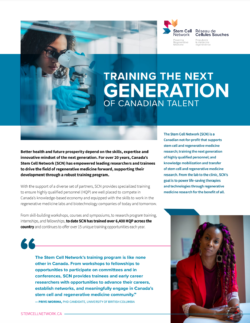Training is a core component of Stem Cell Network’s mandate, and over the last two decades SCN has provided training opportunities to more than 7,000 highly qualified personnel (HQP).
SCN’s training commitment recognizes that a well-trained workforce is a requisite for accelerating translational research and growing the Canadian knowledge economy. SCN’s goal is to provide Canada’s regenerative medicine research community, from HQP through to investigators, with opportunities to build key skillsets and maximize their potential for effectively participating in the regenerative medicine sector. To achieve this, SCN offers a comprehensive training program spanning four key pillars of activity: Core Skills for Academia, Foundational Skills for Industry, Commercialization of Research, and the Art of Clinical Translation. The workshops, courses, symposiums, internships, travel awards and other training opportunities SCN offers across these pillars are designed to:

Read more about SCN’s training program in our recent publication entitled, Training the Next Generation of Canadian Talent.
- Promote rigour and reproducibility to maximize the translational impact of outputs arising from SCN research funding investments in regenerative medicine.
- Prepare HQP for careers in academia and industry.
- Accelerate Canadian regenerative medicine research by building competence in foundational skills and cutting-edge techniques.
- Facilitate the clinical and commercial translation of regenerative medicine discoveries.
- Support early career researchers in the development and success of new research programs.
SCN’s training opportunities are open to researchers working in a Canadian stem cell/regenerative medicine lab, regardless of whether the lab has received SCN funding. Stem Cell Network offers a wide range of training and professional development programs through Workshops and Courses, Travel Awards, Internships, Fellowships, and Exchanges.



